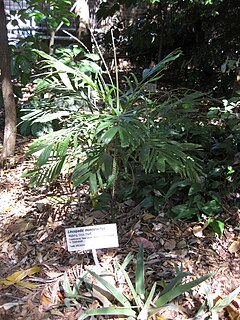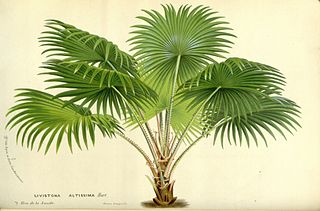Related Research Articles

Livistona is a genus of palms, the botanical family Arecaceae, native to southeastern and eastern Asia, Australasia, and the Horn of Africa. They are fan palms, the leaves with an armed petiole terminating in a rounded, costapalmate fan of numerous leaflets.

Archontophoenix is a plant genus comprising six palm species that are native to New South Wales and Queensland in eastern Australia. They are tall, slender and unbranched. Relationships between Archontophoenix and the other genera of subtribe Archontophoenicinae, including the New Caledonia endemic Actinokentia, Chambeyronia and Kentiopsis are unresolved.

Basselinia is a genus of flowering plant in the family Arecaceae. The entire genus is endemic to the Island of New Caledonia in the Pacific. In some molecular phylogenetic analyses, Hedyscepe from Lord Howe Island is nested in Basselinia.

Carpoxylon macrospermum is a species of palm tree endemic to Vanuatu, and the only species in the genus Carpoxylon.

Cyphophoenix is a genus of flowering plant in the family Arecaceae. It contains 4 known species, all endemic to New Caledonia. The relationships between Cyphophoenix and some other genera of the tribe Basseliniinae including Physokentia and the New Caledonia endemic Burretiokentia are not clear.

Cyrtostachys is a genus of flowering plant in the family Arecaceae. Its species are found in southeast Asia, New Guinea, and in some of the South-Central and Southwest Pacific island habitats of the Oceanian realm.

Hedyscepe canterburyana, the big mountain palm or umbrella palm, is the sole species in the genus Hedyscepe of the family Arecaceae. It is endemic to Lord Howe Island, Australia and is threatened by habitat loss. It is a solitary palm with a distinct crownshaft, and bears unisexual flowers of both sexes. With the Rhopalostylis palms of Norfolk Island and New Zealand it forms the botanic subtribe Rhopalostylidinae. If differs from Rhopalostylis in minor floral details including having more than six stamens, and in being protandrous rather than protogynous. The two genera were formerly included in Archontophoenicinae until a recent revision. In some molecular phylogenetic analyses, Hedyscepe was found to be nested in the New Caledonia endemic Basselinia.

Linospadix is a genus of flowering plant in the family Arecaceae. It is native to New Guinea and Australia.
Physokentia is a genus of flowering plant in the palm family, native to certain islands of the western Pacific.
Uvariopsis is a genus of flowering plants in the family Annonaceae. The genus is unique to Africa, and consists of about 18 species, all of which are either ramiflorous, cauliflorous or both.

Burretiokentia is a genus of palms (Arecaceae) endemic to New Caledonia containing five species. The relationships between Burretiokentia and some other genera of the tribe Basseliniinae including Physokentia and the New Caledonia endemic Cyphophoenix are not clear.

Cyphokentia is a genus of flowering plant in the palm family endemic to New Caledonia. the genus is named from two Greek words meaning "tumor" and "Kentia", a former palm genus, and the species name translates to "large" and "spike", describing the inflorescence. The genus has two known species and Its closest relative is Clinosperma, also endemic to New Caledonia,. and sole other genus of subtribe Clinospermatinae.

Rhopalostylidinae is a botanical subtribe consisting of two genera of palms from Australia and New Zealand, Hedyscepe and Rhopalostylis. These two genera were formerly included in Archontophoenicinae, to which they are morphologically similar, until a recent revision.
Lyndley Alan Craven was a botanist who became the Principal Research Scientist of the Australian National Herbarium.

Saribus is a genus of palms, native to Southeast Asia, Papuasia and Pacific Islands. They are fan palms, the leaves with an armed petiole terminating in a rounded, costapalmate fan of numerous leaflets.
Clinosperma is a palm tree genus in the family Arecaceae.

Calyptrocalyx hollrungii is a palm species in the family Arecaceae, and is native to Papua New Guinea and to the Indonesian part of New Guinea, Western New Guinea.
Calyptrocalyx amoenus is a palm species in the family Arecaceae, and is native to Papua New Guinea and to the Indonesian part of New Guinea, Western New Guinea.
John Leslie Dowe is an Australian botanist who specialises in palms.
Saribus chocolatinus is a species of palm tree in the genus Saribus, which is native to Papua New Guinea. It is a fan palm.
References
- ↑ Palm searcher Michael Ferrero: "A matter of instinct, trial and error, and good luck"
- ↑ Dowe, J.L. & Ferrero, M.D. (2001) Revision of Calyptrocalyx and the New Guinea species of Linospadix (Linospadicinae: Arecoideae: Arecaceae) Blumea 46: 207-251 ISSN 0006-5196
- ↑ Dowe, J,L. & Ferrero, M.D. (2000) A new species of rheophytic palm from New Guinea. Palms, 44 (4). pp. 194-197.
- 1 2 Michael D. Ferrero (JSTOR)
- ↑ Michael D. Ferrero (Harvard Botanist Database)
- ↑ All the genera and species for M.D.Ferrero in IPNI
- ↑ IPNI. M.D.Ferrero.